The case for Universal Health Care
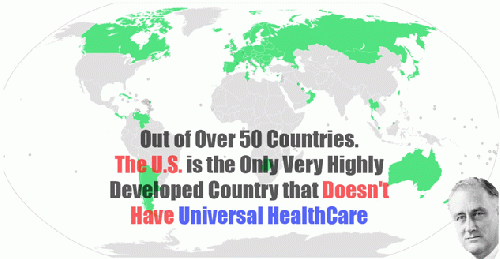
There are two main concerns about health care in the US. Foremost is the cost of health care, which is much higher than it is in other countries. The other issue is the quality of health care.
Cost of Health Care
Under universal health care most of our health care would continue as it currently is; the big losers could be the insurance companies and top medical management. So of course they are not going to let that happen. The amount of money involved needs to be understood to appreciate the enormous amount of effort that is used to attack and stop all health-care proposals.
Health-Care CEO Compensation
Not enough people realize that health-care management receives many millions of dollars every year. This is not just a few executives, but hundreds of managers all across the country and throughout the industry. The justification for these obscene levels of compensation is that the best managers are needed to oversee these big companies. That is a baseless claim. The truth is that there are thousands of fully qualified, outstanding leaders who would do a good, or better, job for only $2 million a year instead of $20 million.
A great leader is creative, experienced, and aggressive but extreme levels of compensation are actually a deterrent to innovative planning and decisions. Studies have shown that higher salaries do not lead to better management or to higher stock dividends. A highly paid executive has little incentive to gamble on some new technology or risky expansions. She is concerned with maintaining the status quo and avoiding any mistakes. A good example of how this conservative thinking can be counterproductive is the case of IBM failing to embrace the enormous potential of personal computers and the Internet. Instead of investing in the unfamiliar world of PCs and the Internet, IBM gave Microsoft a contract to develop this market. This is the worst business decision ever made and it was due to the conservative thinking of highly paid corporate executives who were not interested in doing anything different.
The chart below shows how CEO salaries have exploded in the past few years with some more than doubling in a relatively short period of time. These astronomical compensations add no value to the health service provided. No other country has this enormous overhead to deal with.
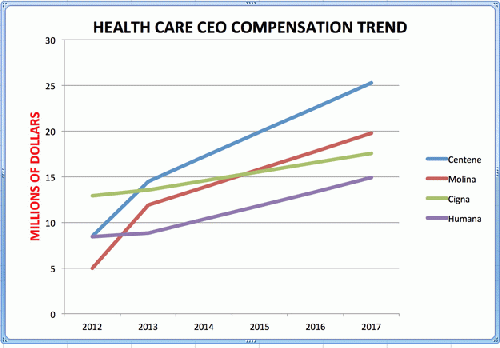
Health Care CEO Compensation Trend
(Image by YouTube, Channel: health care)
2017 Health Care CEO Compensation
Ian Read (Pfizer) $26.17 million
Michael F. Neidorff (Centene) $25.26 million
Alex Gorsky (Johnson & Johnson) $22.84 million
Joseph M. Zubretsky (Molina Healthcare) $19.74 million
Richard A. Gonzalez (AbbVie) $19.13 million
Giovanni Caforio (Bristol Myers-Squibb) $18.69 million
David M. Cordani (Cigna) $17.55 million
Timothy Wentworth (Express Scripts) $15.90 million
Miles D. White (Abbott Laboratories) $15.62 million
John F. Milligan (Gilead Sciences) $15.44 million
Bruce D. Broussard (Humana) $14.87 million
Stefano Pessina (Walgreens) $14.67 million
David A. Ricks (Eli Lilly) $14.50 million
R. Milton Johnson (HCA Healthcare) $13.71 million
George S. Barrett (Cardinal Health) $10.99 million
AVERAGE – $16 million in 2017.
Administrative Overhead
Administration of all the disparate insurance policies and programs adds a large layer of administrative overhead to the cost of health care in the US. The administrative overhead is orders of magnitude greater in the US than in other countries. Health-care administration is incredibly complicated due to all the many ways health care is paid to providers. The US has a plethora of insurance companies and programs, government programs, and countless provider policies and guidelines. It takes an army of clerical employees and mountains of forms to manage and coordinate all these confusing systems. The medical-billing work is so complicated it requires nearly one year of specialized training and certification in medical billing and coding. Medical-coding employees earn about 24 dollars per hour and about $50,000 per year, depending on location. The US Government Accountability Office concluded, “If we could get administrative costs of our medical system down to the Canadian level, the money saved would be enough to pay for health care for all the Americans who are uninsured.”
De Facto Monopolies
Normally, free-market competition would provide incentives to keep costs low. However, there is little, if any, competition in the US health-care system. It is next to impossible for the consumer to shop around for the most cost-effective and customer-friendly provider. If your physician sends you to Good Luck Hospital, you don’t argue and demand to send out an RFP (request for proposal) to local hospitals asking them for bids on your brain-transplant operation. Also, you do not put an ad on Craig’s List to interview anesthesiologists or LVNs. Health care does not operate in a competitive free market.
In 2003, Billy Tauzin, a Republican congressman from Louisiana, was the Republican chairman of the House Committee on Energy and Commerce. Billy was given the responsibility of defining the rules in the Medicare Drug Bill. Tauzin allowed the drug companies to write the Medicare Drug Bill. That’s right–Billy gave the keys to the henhouse to the fox. Tauzin did this because Republican priority is the profits of the drug companies. They obviously had little concern for the affordability of drugs sold to the public.
The easiest way to guarantee enormous drug-company profits is to eliminate any obstacles to competitive drug pricing. So that’s what the drug-company lobbyists did when they wrote the Medicare Drug Bill. This drug company-written bill made it illegal to negotiate for lower drug prices as it is done by the VA hospitals, by HMOs, and by other countries in the world. The Republican bill prevented Medicare drugs from being competitively priced. This is the opposite of what politicians are always preaching–that free markets and competition will keep prices down. Yet Republicans outlawed the competitive markets for Medicare drug prices. The drug companies were so grateful to Billy Tauzin for handing them billions of dollars of your money that Tauzin was hired as the chief drug lobbyist at $2 million per year. So thanks to Republicans, the enormous drug profits and Tauzin’s compensation eventually come out of your bank account.
The Medicare Prescription Drug, Improvement, and Modernization Act of 2003 was passed on November 11 of that year. Eighty-two percent of Republicans voted for the bill that prohibited free-market drug pricing while 76% of Democrats voted against the bill. Which party is the party of free markets? Ever since then, Americans have been handing over billions of their hard-earned wages to drug companies for no reason other than Republicans voting to ensure their wealthy sponsors would continue giving them campaign money. Republicans talk about free-market competition but then did the opposite, which raises prices for consumers. All politicians must be held accountable for their actions. Republican politicians should be held accountable for their decision to suppress the free-market pricing of Medicare drugs.
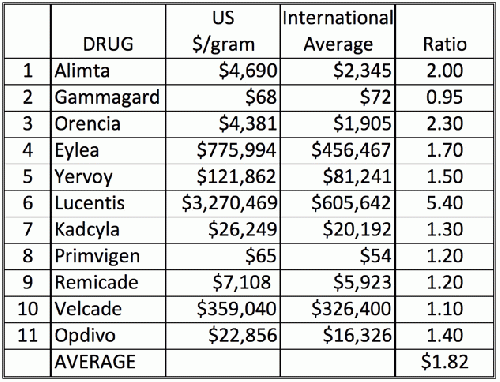
US and International Drug Prices
(Image by YouTube, Channel: health care)
US and International Drug Prices
These problems could have been minimized with the government-insurance option that was proposed for inclusion in the Affordable Care Act. But Republicans, who attack all government services as inefficient, refused to even consider a public-option alternative. They argued that a government-insurance option would be so efficient and cost-effective that it would drive the for-profit insurance companies out of business and insurance would become more affordable for Americans. If you are not paying attention, you should read that last sentence again. The party that claims all government operations are wasting money rejected the non-profit, public-insurance option because it would be too cost-effective. Republicans have always opposed any and all forms of government involvement in health care.
Everything in the US health-care system comes with a profit margin on top of the actual cost. No other country considers the lives of its citizens to be an opportunity to make enormous profits. When profits are the goal of an organization, everything else, such as quality health care, is a lower priority. Sacrifices are made, and corners are cut to maximize profits, not to increase the quality of health care. As long as the primary goal of health care in the US is to increase profits, health care will always be stuck with multi-million-dollar salaries, enormous price markups and less than optimum health care for Americans.
Two-thirds of individual US bankruptcies are related to health-care cost and thousands die without treatment because they have no money to pay for health care.
Quality of Health Care
With so many billions of individual incomes and corporate profits tied to our current health-care system it is virtually impossible to make any changes no matter how much they benefit individual Americans. The profit people will go to any lengths to convince you that universal health care is a disaster. Of course it is not.
Several studies have been conducted over the years comparing the quality of health care under various systems. The studies looked at a wide variety of metrics. The table below shows the UK to be the best and the US to be the worst.
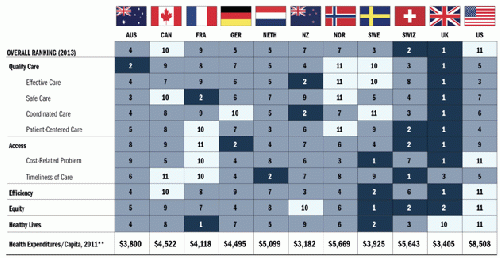
Health Care Performance by Country
(Image by YouTube, Channel: health care)
Health-Care Performance by Country
Since the cost of health care is so much higher in the US than in foreign countries, why is the quality not significantly better than other countries? There may be several reasons for this, but some reasons certainly are the enormous overhead and the profit-driven corporations. In health-care polls, Americans wanted major changes while foreign countries want only minor adjustments.

Health Care Satisfaction
(Image by YouTube, Channel: health care)
The chart below shows how US health care costs have risen much more since 1980 than it has in foreign countries. Meanwhile people are living longer in those other countries. Living longer is only one of many metrics that reveal how expensive US health care is not more effective than that in foreign countries.
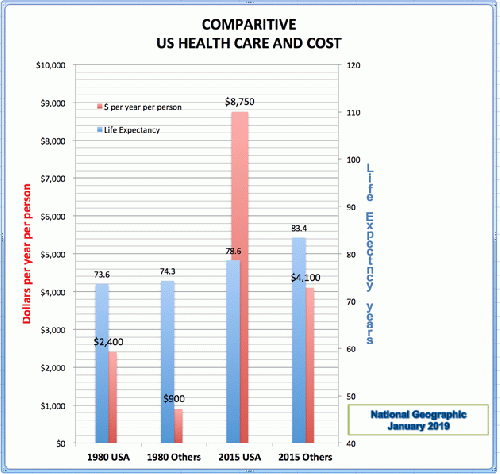
Comparative US Health Care and Cost
(Image by YouTube, Channel: health care)
Summary
Although Americans have good health care, many cannot afford it. So they lose their life’s savings and go bankrupt. Also thousands just get sick and die without ever getting any medical help. As long as health care is a private, profit-driven industry, costs will remain high and many will just not receive treatment. The wealthy ruling class will not allow the current system to be replaced but it is possible that a parallel government system could be created.
To maintain their high salaries and profits, corporations must convince Americans that universal health care is seriously substandard and it is a socialist scheme to destroy capitalism.
However more Americans are starting to realize that universal health care is affordable, effective and popular in foreign countries. The lack of a single universal health-care system is a big reason America has been less capable of dealing with COVID-19 then many other countries. Our current chaotic health care is great for the mega-millionaires but it is a major problem for the working class. We can do better.
For more information on this and related subjects see the book “The Liberal Record” on Amazon.